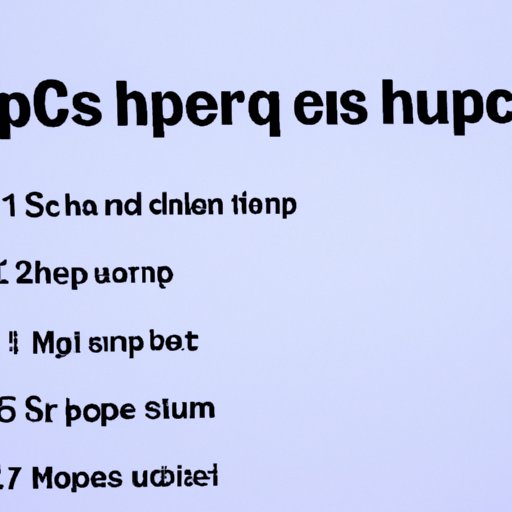Introduction
Hiccups are an involuntary spasm of the diaphragm that leads to a sudden inhalation of air. They’re usually harmless and often cause more annoyance than anything else. But can you really die from hiccups while sleeping? In this article, we’ll explore the connection between hiccups and sleep, looking at potential risks associated with hiccupping in your sleep and how to tell if your hiccups are serious.
Exploring the Connection Between Hiccups and Sleep: Can You Die From Hiccups While Sleeping?
The risk of dying from hiccups in your sleep is extremely rare. However, it’s not impossible. In some cases, hiccups could be a sign of an underlying health condition or medical emergency that requires immediate attention. It’s important to understand the potential risks associated with hiccupping in your sleep and when to seek medical help.
Separating Fact From Fiction
There are many myths surrounding the relationship between hiccups and death. For instance, some people believe that hiccups can lead to suffocation or even heart failure. However, there is no scientific evidence to support these claims. In fact, hiccups rarely last longer than a few minutes and aren’t typically dangerous.
How to Stop Hiccups While Sleeping – And Avoid a Deadly Outcome
The best way to prevent hiccups while sleeping is to avoid any activities or behaviors that may trigger them, such as drinking alcohol, smoking, eating too quickly, or consuming large amounts of spicy or acidic foods. Additionally, practicing relaxation techniques before bed can help reduce stress levels and prevent hiccups from occurring.
If you find that you’re hiccupping during the night, there are several methods you can try to stop them. These include holding your breath, drinking a glass of water, or taking deep breaths. If none of these methods work, it’s best to seek medical advice.
What Causes Hiccups at Night and Could It Lead to Death?
Hiccups at night can be caused by a variety of factors. Common triggers include indigestion, acid reflux, stress, certain medications, or even excitement. In most cases, hiccups will go away on their own after a few minutes. However, if they persist for more than 48 hours or are accompanied by other symptoms, it’s important to seek medical attention.
Though it’s highly unlikely, hiccups at night could potentially lead to death in some cases. For instance, hiccups could be a sign of a more serious health condition such as pneumonia, stroke, or even cancer. If left untreated, these conditions could become life-threatening.
Are Hiccups at Night Dangerous? A Look at the Connection Between Hiccups and Sleep
Hiccups at night can be disruptive and uncomfortable, but are generally not dangerous. However, if you experience hiccups that last longer than usual, or are accompanied by other symptoms such as chest pain, difficulty breathing, or dizziness, it’s important to seek medical attention. These could be signs of a more serious health condition that requires immediate treatment.
Is It Possible to Die From Hiccups While Sleeping?
Though it is possible, it’s highly unlikely that you would die from hiccups while sleeping. However, if you experience hiccups that last longer than usual, or are accompanied by other symptoms, it’s important to seek medical attention. In some cases, hiccups may be a sign of an underlying health condition that requires immediate treatment.
Scientific research has found that hiccups can be linked to a number of medical conditions, including brain tumors, strokes, and heart attacks. In very rare cases, hiccups can also be a sign of respiratory problems or a pulmonary embolism. If left untreated, these conditions can be life-threatening.
How to Tell If Your Hiccups Are Serious – And What to Do About Them
In most cases, hiccups are nothing to worry about. However, if your hiccups last longer than usual or are accompanied by other symptoms such as chest pain, difficulty breathing, or dizziness, it’s important to seek medical attention. These could be signs of a more serious health condition that requires immediate treatment.
Treatments for severe hiccups vary depending on the underlying cause. Common treatments include medications, lifestyle changes, or even surgery. In some cases, acupuncture or hypnosis may also be recommended.
Conclusion
Hiccups are a common occurrence, but can you really die from hiccups while sleeping? While it is possible, it’s highly unlikely. However, if your hiccups last longer than usual or are accompanied by other symptoms, it’s important to seek medical attention. Treatments for severe hiccups vary depending on the underlying cause, but may include medications, lifestyle changes, or even surgery.
It’s always best to practice healthy habits in order to prevent hiccups from occurring in the first place. These include avoiding activities or behaviors that may trigger hiccups, such as drinking alcohol and smoking, and practicing relaxation techniques before bed. By following these tips, you can help ensure a safe and peaceful night’s sleep.


